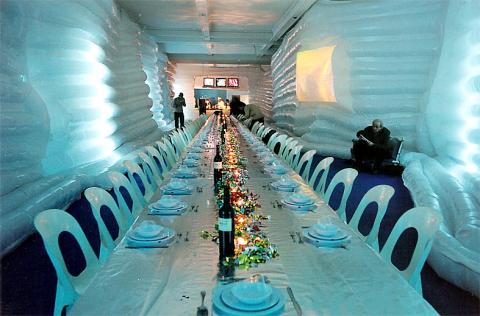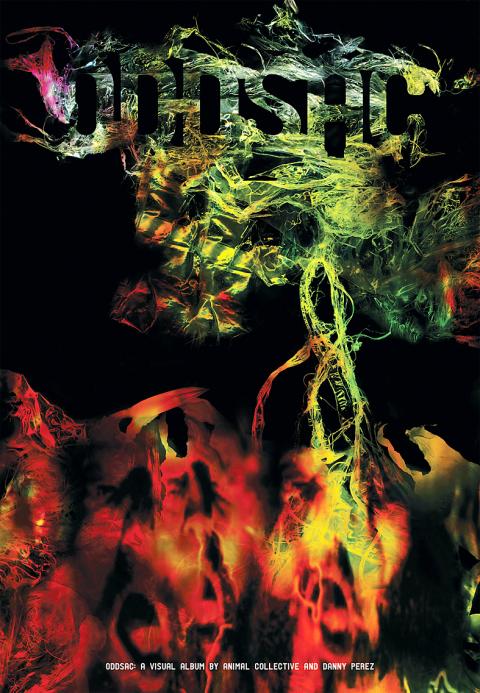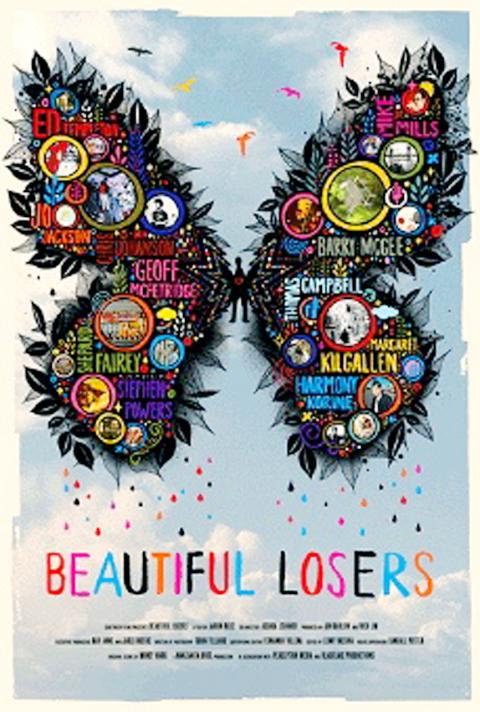Now in its 11th year, the Urban Nomad Film Festival rolls into town on Thursday next week.
This year’s theme is “art, creativity and design” and the event’s roster of 11 feature-length documentaries and films focus on topics ranging from an ornery RV salesman to the world’s best-known sans serif typeface. Four to six independent short films selected from a pool of about 300 submissions will also be screened each night. Two nights focus on Chinese artist Ai Weiwei (艾未未). The festival was planned well before Ai’s detainment by Chinese authorities earlier this month, but his arrest makes the two documentaries that will be screened especially topical.
The organizers of Urban Nomad decided on this year’s theme in part because of the Taiwanese government’s increasing focus on the “cultural and creative” industries.

Photo Courtesy of URBAN NOMAD
“The number of art and design students here is enormous. We know that because we get a lot of their films for our program,” founder David Frazier told the Taipei Times. “But nobody has ever really done a focused segment on films about contemporary art and design.”
The festival kicks off on Thursday next week with Oddsac, a “visual album” by video artist Danny Perez and experimental rock band Animal Collective. Perez will be on hand to answer questions after the 54-minute-long film, which pairs 13 songs with mesmerizing visuals.
Along with a performance by Brooklyn-based tribal-freakout band I.U.D., Perez will deejay at Urban Nomad’s Video Mindfuck party on April 30 at Huashan 1914 Culture Park.

Photo Courtesy of URBAN NOMAD
The festival’s official opening film is 2009’s Winnebago Man, a documentary directed by Ben Steinbauer about one of the first viral videos ever made. Outtakes from a 1988 RV commercial shoot featuring a foul-mouthed salesman with a short fuse circulated on VHS tapes before eventually enjoying a second life online. Obsessed with the clips, Steinbauer tracked down salesman Jack Rebney at his California home. The film will have its Taiwanese premiere at Urban Nomad on April 29.
“It was a viral video before the Internet and it’s kind of impossible to say that technology does not influence art right now,” Frazier says.
Viewers can get insight into Ai’s work as a political activist on May 1 with Why Are These Flowers Red? (花兒為什麼這樣紅) by activist, professor and director Ai Xiaoming (艾曉明). The film documents the beating that Ai received from police during a trip to Sichuan Province to testify at the trial of fellow activist Tan Zuoren (譚作人), who was arrested for subversion after setting up a database of children who died in the 2008 Sichuan Earthquake.

hoto Courtesy of URBAN NOMAD
On May 8, Ai’s own account of his confrontation with government authorities in Sichuan Province, Lao Mao Ti Hua (老媽蹄花) will be shown. A video conference with Ai was originally scheduled to follow the screening; Urban Nomad now plans to have a chat with a member of Ai’s studio instead.
“Ai’s activism is very much in a different direction from a lot of his art or a lot of what is exhibited in museums,” Frazier says. “With the solo show [of Ai’s work] scheduled to be held at the Taipei Fine Arts Museum at the end of this year, we felt it was important to show these films in Taiwan so his political content would not be whitewashed or left out.”
Other films about artists in Urban Nomad include In a Dream about American folk artist Isaiah Zagar; Olafur Eliasson: Space is Process, which follows the Danish contemporary artist to extreme environments like Arctic glaciers; and Beautiful Losers, which is about the NYC artists collective that incubated talents like Shepard Fairey and Twist (real name Barry McGee). Helvetica, a 2007 film by Gary Hustwit, focuses on the ubiquitous sans serif font and its impact on graphic design.

Photo Courtesy of URBAN NOMAD
Other topics include Roskilde, northern Europe’s largest rock music festival whose combustive mixture of rock ’n’ roll, drugs, sex and mud is chronicled in the documentary of the same name, and skateboarding, represented by Macho Taildrop, which is about an amateur skateboarder whose dreams of turning pro are stymied by cutthroat competition and training.
Urban Nomad closes on May 8 with Aaron Hose’s Voices in the Clouds. Released last year, the film tells the story of Tony Coolidge, who was born in the US to a Taiwanese woman and an American GI father he never met. After his mother’s death, Coolidge traveled to Taiwan, where he discovered that his family members were members of the Atayal Aboriginal tribe. The film not only documents Coolidge’s self-discovery but also offers an up-close look at the Atayal’s culture and struggles with oppression.

Photo Courtesy of URBAN NOMAD

In the March 9 edition of the Taipei Times a piece by Ninon Godefroy ran with the headine “The quiet, gentle rhythm of Taiwan.” It started with the line “Taiwan is a small, humble place. There is no Eiffel Tower, no pyramids — no singular attraction that draws the world’s attention.” I laughed out loud at that. This was out of no disrespect for the author or the piece, which made some interesting analogies and good points about how both Din Tai Fung’s and Taiwan Semiconductor Manufacturing Co’s (TSMC, 台積電) meticulous attention to detail and quality are not quite up to

April 21 to April 27 Hsieh Er’s (謝娥) political fortunes were rising fast after she got out of jail and joined the Chinese Nationalist Party (KMT) in December 1945. Not only did she hold key positions in various committees, she was elected the only woman on the Taipei City Council and headed to Nanjing in 1946 as the sole Taiwanese female representative to the National Constituent Assembly. With the support of first lady Soong May-ling (宋美齡), she started the Taipei Women’s Association and Taiwan Provincial Women’s Association, where she

It is one of the more remarkable facts of Taiwan history that it was never occupied or claimed by any of the numerous kingdoms of southern China — Han or otherwise — that lay just across the water from it. None of their brilliant ministers ever discovered that Taiwan was a “core interest” of the state whose annexation was “inevitable.” As Paul Kua notes in an excellent monograph laying out how the Portuguese gave Taiwan the name “Formosa,” the first Europeans to express an interest in occupying Taiwan were the Spanish. Tonio Andrade in his seminal work, How Taiwan Became Chinese,

Mongolian influencer Anudari Daarya looks effortlessly glamorous and carefree in her social media posts — but the classically trained pianist’s road to acceptance as a transgender artist has been anything but easy. She is one of a growing number of Mongolian LGBTQ youth challenging stereotypes and fighting for acceptance through media representation in the socially conservative country. LGBTQ Mongolians often hide their identities from their employers and colleagues for fear of discrimination, with a survey by the non-profit LGBT Centre Mongolia showing that only 20 percent of people felt comfortable coming out at work. Daarya, 25, said she has faced discrimination since she